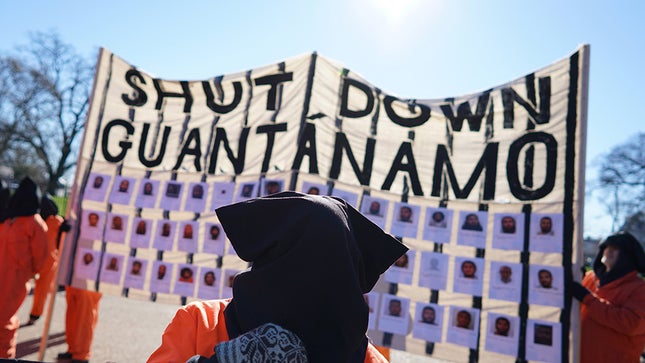President Biden’s decision to fully withdraw from Afghanistan is raising questions about what, if any, effect that will have on the future of the Guantanamo Bay detention center.
At least two prisoners who have been challenging their detention have already updated their complaints to include Biden’s withdrawal as a reason they should be released.
But the war on terrorism will continue even after the last U.S. service member leaves Afghanistan. And the congressional war authorization that has also been used as the legal justification for indefinite detention at Guantanamo does not appear to be going anywhere anytime soon.
“I think the short answer is that we just don’t know,” Steve Vladeck, a University of Texas law professor, said of the withdrawal’s effect on Guantanamo.
“It clearly provides the remaining Guantanamo detainees with a new ground on which to challenge the legal basis for their continuing military detention, and one that is not necessarily foreclosed by existing precedent,” he added in an email. “But it’s not at all clear that courts will be sympathetic to those arguments, not just because they haven’t been to date, but because the Executive Branch is likely to argue that the conflict with al Qaeda isn’t ending just because we’re leaving Afghanistan.”
Forty men remain detained at the facility opened by former President George W. Bush after the U.S. invasion of Afghanistan. Six have been cleared for transfer, and seven have been charged in the military commission system, including the five 9/11 suspects.
The Biden administration is in the midst of reviewing the facility with the intention of closing it, but it remains to be seen whether that effort will be successful.
Former President Obama also sought to shutter the facility, signing an executive order on his second day in office to close it within a year. But his plan relied on transferring detainees to U.S. prisons, something Congress blocked him from doing with a law that remains on the books banning transfers to the United States.
Amid the administration’s review, Biden is facing pressure to fulfill his promise to close the facility.
Twenty-four Senate Democrats penned a letter to Biden last week saying he could close the facility with “sufficient political will and swift action.”
“After years of indefinite detention without charge or trial; a history of torture and cruel, inhuman, and degrading treatment; and multiple attempts at a thoroughly failed and discredited military commission process, it is past time to close Guantanamo’s detention facility and end indefinite detention,” read the letter, which was organized by Senate Majority Whip Dick Durbin (D-Ill.) and Senate Appropriations Committee Chairman Patrick Leahy (D-Vt.).
When Biden announced earlier this month he was ordering a full withdrawal from Afghanistan by Sept. 11, he declared, “It’s time to end the forever war.”
Alli McCracken Jarrar, North American campaigner for Amnesty International, argued that if Biden is serious about ending the “forever war,” he will shutter one of its vestiges.
“I hope that he can align his timeline to withdraw from Afghanistan with his plan to close Guantanamo,” she said. “It would be wonderful to see the whole detention camp shut down and the men transferred out by Sept. 11. And I think that would make a lot of groups feel happy and would really be a positive sign that he’s committed to his human rights obligations.”
This past week, lawyers for two Guantanamo detainees filed motions seeking their clients’ release citing the withdrawal. The motions were first reported by The New York Times.
Lawyers for Khalid Qassim, a 44-year-old a Yemeni man who has been held without trial at Guantánamo for nearly 19 years, are seeking to update his existing habeas corpus lawsuit to include the argument that Biden’s announcement of an “end to the involvement of United States troops in active combat in Afghanistan” means “there can no longer be any legal basis under the [authorization for the use of military force] or otherwise for Qassim’s detention by the United States.”
Lawyers for Asadullah Haroon Gul, an approximately 40-year-old Afghan captured by Afghan forces in 2007, similarly argued in a motion seeking their client’s immediate release that the withdrawal takes away any basis to continue holding him.
“The law is clear: Asadullah gets to go home now, regardless of whether, as the government incorrectly contends, he was part of or substantially supported Al Qaeda,” they wrote in the motion.
But while U.S. troops are withdrawing from Afghanistan, the top U.S. commander in the Middle East, Gen. Frank McKenzie, spent the past week assuring that lawmakers the military would maintain the ability to conduct counterterrorism strikes in Afghanistan even if that is harder to do with troops stationed elsewhere.
“It’s going to be extremely difficult to do. But it is not impossible to do it,” McKenzie said at a House hearing.
Additionally, while the White House has said Biden is open to a rewritten authorization for the use of military force (AUMF) and some lawmakers are working to do that, those efforts face an uphill climb, and the existing 2001 AUMF is expected to stay on the books.
That authorization underlies ongoing U.S. military counterterrorism operations throughout the Middle East, Africa and elsewhere.
“The real reform, as has always been clear, would have to come from Congress,” Vladeck, the law professor, said of the future of Guantanamo.
When Obama declared an end to U.S. combat operations in Afghanistan in 2014 and pledged to bring all troops home by the end of his term, a Yemeni prisoner challenged his detention on the basis that the president said the conflict was over.
But a federal judge ruled in 2015 the detention was still legal because fighting was ongoing regardless of what Obama said.
“A court cannot look to political speeches alone to determine factual and legal realities merely because doing so would be easier than looking at all of the relevant evidence,” Judge Royce Lamberth of the U.S. District Court for the District of Columbia wrote at the time. “The government may not always say what it means or means what it says.”













